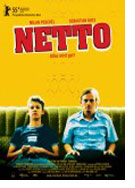

Opening 5 May 2005
Directed by:
Robert Thalheim
Writing credits:
Robert Thalheim
Principal actors:
Milan Peschel, Sebastian Butz, Stephanie Charlotta Koetz, Christina Grosse, Bernd Lambrecht
Netto is a wonderful film made by German director Robert Thalheim. This movie is quite amazing in itself since it was his third semester project for film school. He takes the everyday life situation of one patchwork family living in Berlin. Thalheim used the music of the East Berliner Peter Tschernig, who sounds like Johnny Cash, throughout the movie. This music transmits a message to the characters that a generation is gone by but the words still ring true.
Sebastian is fifteen years old. His father he has not seen in years, and his mother is currently remarried, living in the suburbs, and is about to have a baby. Sebastian has a hard time accepting the new stepdad and baby soon to be, so he decides to seek out his real father. Living in Berlin, Marcel Warner is unemployed and still living in the same flat that Sebastian was born in. Angelika has moved on with her life where Marcel seems stuck. He always maintains a facade of having superior knowledge for special security services, but it looks unlikely that he will ever find a job since he has not received a real education. In actuality he goes on drinking binges, lives from paycheck to paycheck, and listens obsessively to the music of Peter Tschernig.
Sebastian announces to his father that he is moving in, that he needs his father now. This naturally overwhelms Marcel Warner since he wants his son to look up to him and to believe that he has made something of himself. They both struggle to find their appropriate roles in their new relationship. The father soon realizes that his son is smarter than him and has grown up in a different generation. The roles become reversed here, where Sebastian takes steps to help his father to find a job, rewrites his resume, and helps him buy a suit. Soon Marcel's self confidence is improving and in the end father and son find that they actually have a good time together and enjoy each other's company.
Although this film has a sense of humor, it never lets the audience forget the reality of this man's plight. In the end he doesn’t get a job and naturally goes on a drinking binge exactly at the time Sebastian wants him to meet his new girlfriend. Toward the end Marcel, with gun in hand, runs to a nearby bridge and is contemplating suicide. In the background comes the music of Peter Tshernig. The song is Mein bester Kumpel ist und bleibt mein Vater. This film reflects the current ecomonic times and gives the unemployed of Germany a face. (Shelly Schoeneshoefer)